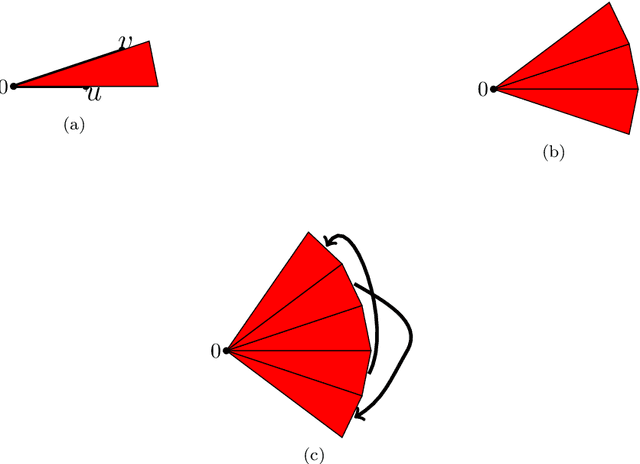Valentino Delle Rose
On statistical learning of graphs
Jul 17, 2025Abstract:We study PAC and online learnability of hypothesis classes formed by copies of a countably infinite graph G, where each copy is induced by permuting G's vertices. This corresponds to learning a graph's labeling, knowing its structure and label set. We consider classes where permutations move only finitely many vertices. Our main result shows that PAC learnability of all such finite-support copies implies online learnability of the full isomorphism type of G, and is equivalent to the condition of automorphic triviality. We also characterize graphs where copies induced by swapping two vertices are not learnable, using a relaxation of the extension property of the infinite random graph. Finally, we show that, for all G and k>2, learnability for k-vertex permutations is equivalent to that for 2-vertex permutations, yielding a four-class partition of infinite graphs, whose complexity we also determine using tools coming from both descriptive set theory and computability theory.
Effective Littlestone Dimension
Nov 22, 2024Abstract:Delle Rose et al.~(COLT'23) introduced an effective version of the Vapnik-Chervonenkis dimension, and showed that it characterizes improper PAC learning with total computable learners. In this paper, we introduce and study a similar effectivization of the notion of Littlestone dimension. Finite effective Littlestone dimension is a necessary condition for computable online learning but is not a sufficient one -- which we already establish for classes of the effective Littlestone dimension 2. However, the effective Littlestone dimension equals the optimal mistake bound for computable learners in two special cases: a) for classes of Littlestone dimension 1 and b) when the learner receives as additional information an upper bound on the numbers to be guessed. Interestingly, finite effective Littlestone dimension also guarantees that the class consists only of computable functions.
Three iterations of $$-WL test distinguish non isometric clouds of $d$-dimensional points
Mar 28, 2023
Abstract:The Weisfeiler--Lehman (WL) test is a fundamental iterative algorithm for checking isomorphism of graphs. It has also been observed that it underlies the design of several graph neural network architectures, whose capabilities and performance can be understood in terms of the expressive power of this test. Motivated by recent developments in machine learning applications to datasets involving three-dimensional objects, we study when the WL test is {\em complete} for clouds of euclidean points represented by complete distance graphs, i.e., when it can distinguish, up to isometry, any arbitrary such cloud. Our main result states that the $(d-1)$-dimensional WL test is complete for point clouds in $d$-dimensional Euclidean space, for any $d\ge 2$, and that only three iterations of the test suffice. Our result is tight for $d = 2, 3$. We also observe that the $d$-dimensional WL test only requires one iteration to achieve completeness.
Find a witness or shatter: the landscape of computable PAC learning
Feb 23, 2023Abstract:This paper contributes to the study of CPAC learnability -- a computable version of PAC learning -- by solving three open questions from recent papers. Firstly, we prove that every improperly CPAC learnable class is contained in a class which is properly CPAC learnable with polynomial sample complexity. This confirms a conjecture by Agarwal et al (COLT 2021). Secondly, we show that there exists a decidable class of hypothesis which is properly CPAC learnable, but only with uncomputably fast growing sample complexity. This solves a question from Sterkenburg (COLT 2022). Finally, we construct a decidable class of finite Littlestone dimension which is not improperly CPAC learnable, strengthening a recent result of Sterkenburg (2022) and answering a question posed by Hasrati and Ben-David (ALT 2023). Together with previous work, our results provide a complete landscape for the learnability problem in the CPAC setting.
 Add to Chrome
Add to Chrome Add to Firefox
Add to Firefox Add to Edge
Add to Edge